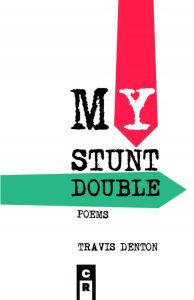Reviewed by Jeremy Lindlan

Poetry is meant to make us think. It is meant to make us feel and wonder. We as an audience are meant to learn something by reading, not merely of facts, but feelings and new perspectives. The experience the poem provides its audience with, however, cannot be entirely unfamiliar; it must find a way to connect and even contribute to the reader’s understanding of themselves and the world they live in: this is where Travis Denton’s newest collection of poems, My Stunt Double, finds the greatest success. The work is a contemporary yet refreshing return to the exploration of the poetic imagination and its human complexity, unafraid to consider the brightest and darkest aspects of our hopes, loves, dreads, and dreams.
Immediately, the collection begins with one of its most powerful poems, “What Beauty Gives Us.” It depicts the thoughts of a man pondering “the red dot” and its fading lifeforms:
“All I can think of is TV news
And a rover tracking its way,
Making ruts—its slow wheels climb
Dust and ice dunes as it searches
For life I cannot know—
Something with twelve arms,
A row of eyes around what we’d call
A head, I think of its dying,
Of all their dyings—how they could have died
One by one, generations—fathers, sons,
Idiots and bastards—until the very last…”
From here, Denton begins to present a unique perspective as a reflection that challenges our limited perception against that of an otherwise limitless universe. Even with the next poem, “The Body,” the audience reads about the estranged viewpoints of overlooked ‘things’ as in an essential yet uncommunicative relationship with us as living bodies:
“The orange pines
For your tongue—
Starves without you.”
And later:
“Your footprints
Chase after you
And have found
Only your shoes
By a river.”
The subjects of Denton’s poems are often grounded in familiar subjects, only to be lifted by his characteristic, imaginative spin; in these first two poems, he successfully creates a prevailing feeling of longing—and needing—to be felt.
At other times, Denton’s poetry is not only an exploration but a wholehearted confrontation with reality and its inseparable relationship to our imagination, especially when considering our own expectations and human potential. The poem the collection is named after, “My Stunt Double,” involves the reminiscence of a once creative man who now sits “desk-side, coffee mug ring / Coalescing on a stack of forms / That need signed,” dreaming of his far more adventurous “Double” and the moment that they both changed forever. The poem, in a sense, could be read as a sort of warning, a story of two potential paths distinct in their destinations: there is the man in his life of safety and security as ‘the molded image’, and there is the life of the imagined Stunt Double, one of adventure, courage, and danger.
With this in mind, one might interpret Denton’s underlying concept of the imagination as not inherently good or bad, but instead as only in acts of creation, contemplation, exploration, and even revelation. In “Achilles Realizes There Is No God,” the idea of the imagination is explored introspectively; the mythic character Achilles is pictured to be in a state of contemplation (a stark contrast to his conventional portrayal), using his imagination to ponder “everyone’s unmaking.” Eventually, Achilles arrives at a conclusion that “He’s even unmade the gods who made him, / That not a goddamned thing is wrought or destined” and that there is “No divine mover.” Other poems in Denton’s work also explore concepts of divinity and God to varying degrees, and to possibly differing conclusions.
One of the greatest strengths of Denton’s poetry comes with the seemingly relative ease his style creates strikingly original images. Sometimes, these images are colorful, whimsical, and often humorous, like in the poem “Balloons:”
“Hipsters threw down their bikes.
Tokyo, Milwaukee, Calgary
And all points between reported
The sky opening, as if scored, and bled rainbow—
An unrelenting rainbow that swelled
And bellowed more rainbow.
A few clowns here and there
Pulled, twisted, and knotted them,
Tried to work them into poodle with bone…”
Other images can be haunting in their appearance and meaning, sure to remain within the audience’s mind even after they finish reading, such as in this excerpt from, “In the Days When There Were Many Gods:”
“There was a barn owl with an arrow through one eye
That lived in my back yard—at any second it was staring
Down the shaft of the weapon with its one good eye—
The feathered end of the bolt sticking from the back of its head.”
The wide variation in image themes—sometimes wonderful, other times raw and gloomy—seeks to take the audience to places both familiar and unfamiliar through a kind of imaginative escalation.
Travis Denton’s poetry in My Stunt Double places an unconventional spin upon the human perspective in often unhuman, and in some cases, too human, ways. His poems can create a plethora of inspired colors wrapped together in sensations of passion and sentimentality, or they can throw you without warning into the realm of the unforeseen, uncomfortable, and even apocalyptic. In the end, Denton’s work succeeds as a collective, exploratory depiction of the authentic imagination.
